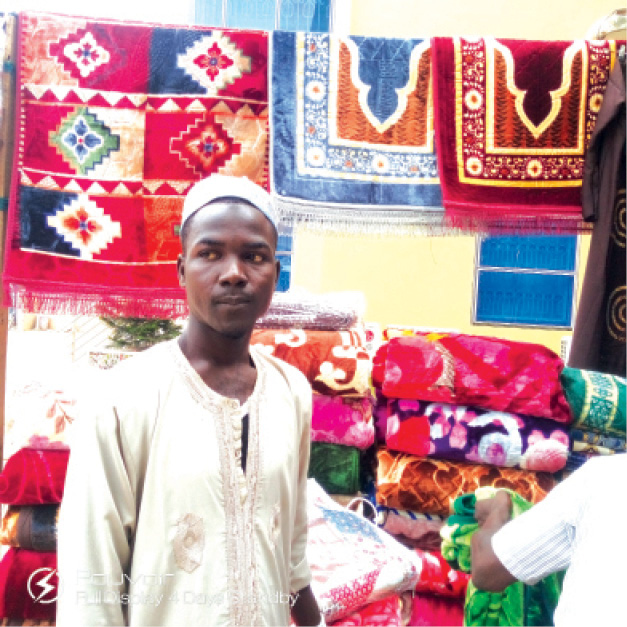Kano Hajj camp traders decry low patronage
Traders at the Hajj Camp market in Kano metropolis have decried low patronage since the advent of COVID-19 in Nigeria. Some of the traders, who spoke with Chronicle, expressed their displeasure with the development, attributing the low patronage to the cancellation of last year’s annual pilgrimage by the Saudi authorities. Obaseki, Kwankwaso commission Hajj Camp […]

Traders display their wares at the Hajj Camp market. Photo: Lubabatu I. Garba
Traders at the Hajj Camp market in Kano metropolis have decried low patronage since the advent of COVID-19 in Nigeria.
Some of the traders, who spoke with Chronicle, expressed their displeasure with the development, attributing the low patronage to the cancellation of last year’s annual pilgrimage by the Saudi authorities.
Obaseki, Kwankwaso commission Hajj Camp in Benin
NAHCON begins 2021 hajj registration
Nura Rabi’u Idris, who sells clothes at the market, told Chronicle that the cancellation had affected their annual gain.
“You know most of our customers are Hajj and Umara returnees who used to buy some goods; like zamzam, bagaruwa, dates, Jallabiya and praying mats.
“In a time like this, we are always busy receiving customers and making a lot of money.
“So now that the annual pilgrimage did not take place, we are at the receiving end.
“At the moment, traders could come to the market and close for the day without selling a single item,” he said.
Another trader, Muhammad Umar, lamented that apart from low patronage, the prices of goods had skyrocketed since the pandemic came into the country.
“Since the advent of COVID-19 in Nigeria prices of goods have been moving higher and it is affecting businesses, rather than making profit, we are counting loses,” Umar said.
Alhaji Sadis Bala, who said that he had been recording huge loss since the commencement of the pandemic, called on the landlords, who own shops at the complex, to sympathise with the traders by subsidising the rent.
He also called on the state government to lift various levies on them.
“We are experiencing low patronage and paying different types of levies. So we call on the government to lift these charges on us,” he said.
Malam Nura Ibrahim, another trader, called on his colleagues to be patient and consider their predicament as a destiny.

“Even though nobody was expecting the ugly development but there is nothing one can do rather than to exercise patience and bear the situation.
“As Muslims, we know that Allah can test every believer’s faith.
“So, I call on my colleagues to take this as a will of God.
“We have to thank the Almighty Allah for being alive and healthy and pray to Him to change the situation for the better”
Yunusa Isah, a cloth seller, told Chronicle that he had not made a single sale for the past one week, but added that he was hopeful the situation would improve soon.
Malam Ahmad Ali said he had reduced the prices of goods at his shop to attract more customers.
“I am not bothered to reduce the prices of goods so that I can sell enough to take care of my family.
“Alhamdulillah, I am attracting customers by doing so,’’ he said.
The Public Relations Officer of Hajj Camp Traders Association, Alhaji Aminu Baba Gama, said the traders had already lost their annual gain as the business in the market was seasonal.
“Even though we open the market everyday, but the peak period when our business is booming is around this time.
“It is at this period we make the money we use to pay rent, buy foodstuff and pay our children’s school fees, among others.
He said some traders were yet to recover from the loss they suffered from a fire outbreak, which occurred two years ago.
Baba Gama called on the state government to come to their aid as most of the traders had lost their capitals to the pandemic.
“We are using this opportunity to call on the government to come to our aid.
“We have not recuperated from the situation we found ourselves two years ago as a result of the fire incident and now we are experiencing another dilemma,” he said.
